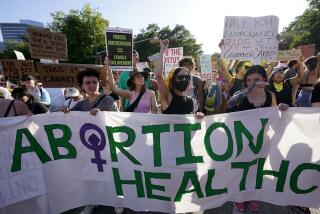The Hobby Lobby dodge

The Supreme Court can’t do much about most of the travails afflicting implementation of the Affordable Care Act. But it can put one controversy to rest by rejecting the dangerous claim that profit-making businesses have a “religious” right to defy a federal mandate that they include contraceptive coverage in their employees’ health insurance plans.
On Tuesday, the justices agreed to review two appeals court decisions that came to opposite conclusions on that question. In one of the cases, Hobby Lobby Stores Inc., a chain of crafts stores with 13,000 full-time employees that operates on “biblical principles,” argued that the mandate would require that its employees’ insurance plans include drugs that functioned as abortifacients. The U.S. 10th Circuit Court of Appeals accepted the argument that forcing the company to comply with the mandate would violate the owners’ rights under the Religious Freedom Restoration Act.
That 1993 law says that a “person” can seek to opt out of a law under some circumstances if obeying it would “substantially burden” the exercise of his or her religion. The 10th Circuit, citing the Citizens United decision holding that corporations have a 1st Amendment right to communicate about political campaigns, concluded that Hobby Lobby likewise had a right to religious freedom. But while there was long-standing precedent that some corporations have free-speech rights, the notion that profit-making businesses engage in the exercise of religion is a novel — and nonsensical — one.
That was emphasized in the second of the two decisions the justices will review. In rejecting a lawsuit against the mandate by a Pennsylvania manufacturer of wooden cabinets, the U.S. 3rd Circuit Court of Appeals wrote: “General business corporations do not, separate and apart from the actions or belief systems of their individual owners or employees, exercise religion. They do not pray, worship, observe sacraments or take other religiously-motivated actions separate and apart from the intention and direction of their individual actors.”
Even if the corporations were “persons” under the Religious Freedom Restoration Act — an idea that would surprise many who voted for it — the law refers to a “substantial burden” on the exercise of religion. There is no such burden here. No employer is being forced to use contraceptives; that decision will be made by the employee. The logical extrapolation from Hobby Lobby’s position is that a business could refuse to pay the minimum wage because a worker might spend some of her paycheck on birth control or other “immoral” activities.
A ruling for Hobby Lobby, grounded in either the Religious Freedom Restoration Act or the 1st Amendment, would do more than throw a legal wrench into the implementation of Obamacare. It would potentially blow a hole through all sorts of laws that require businesses to treat their employees fairly even if doing so might offend an employer’s religious views. The court should reject such a radical reinterpretation.
More to Read
A cure for the common opinion
Get thought-provoking perspectives with our weekly newsletter.
You may occasionally receive promotional content from the Los Angeles Times.










